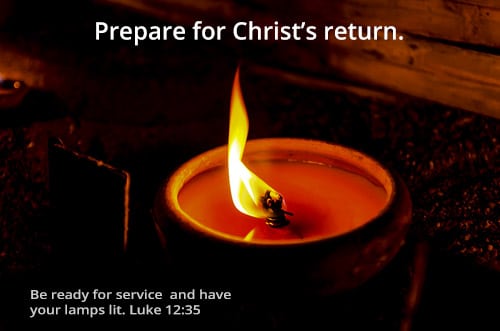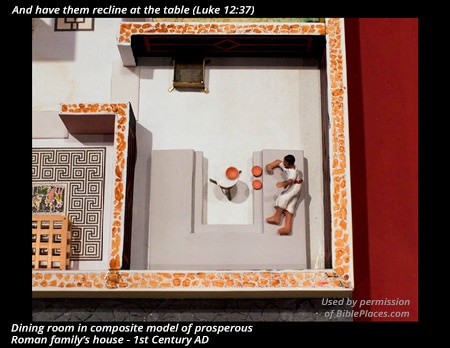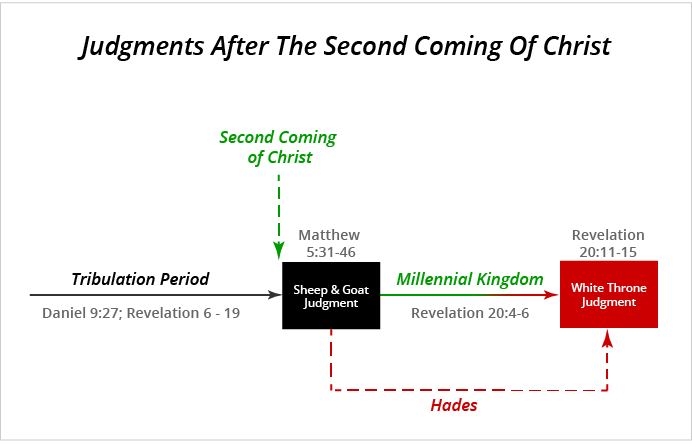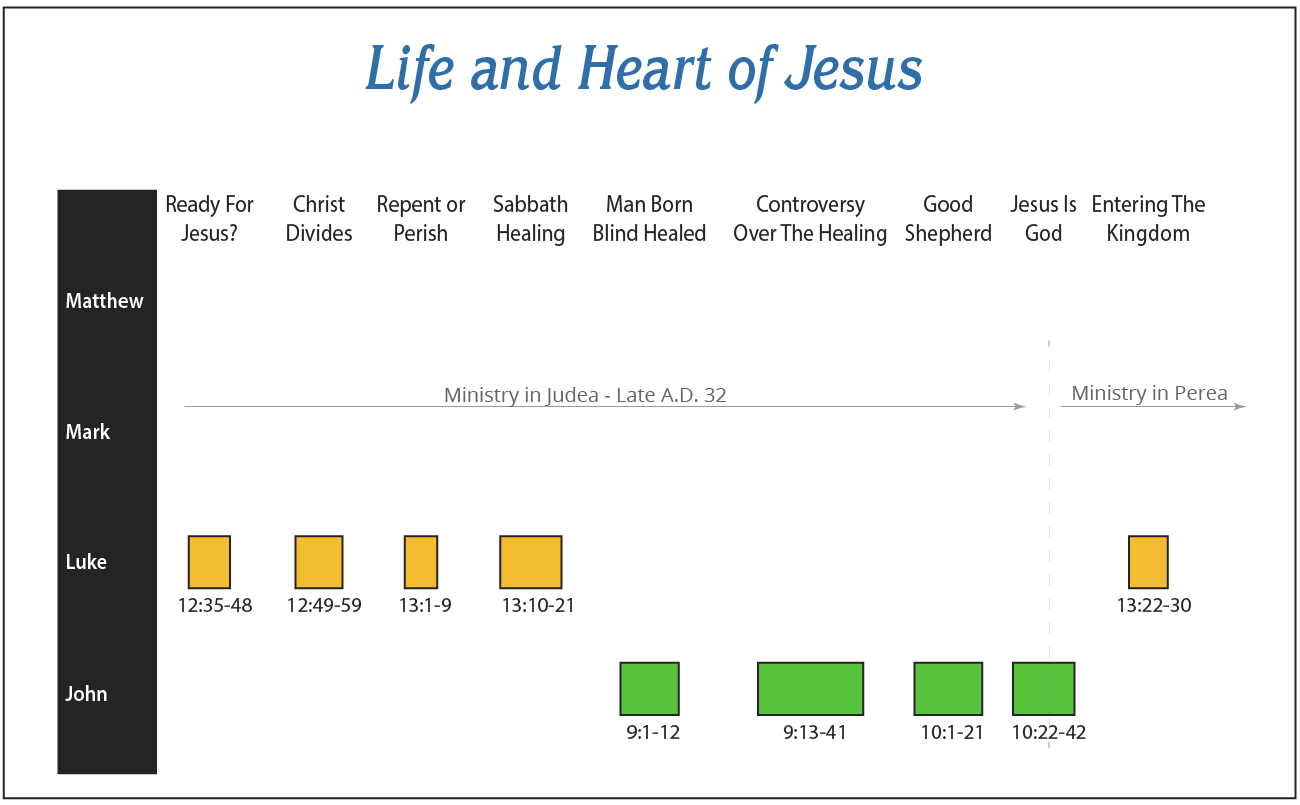
The Second Coming of Jesus Christ should motivate every Christian to be obedient and holy, and should cause fear for every non-Christian. The first time Christ came, He came to die for the sins of the world (John 1:29). He was born in a tiny village called Bethlehem and later died five miles away outside of Jerusalem on a cross. Since He was God, He was resurrected three days later with an immortal body (1 Corinthians 15:3-4) and ascended back to heaven forty days after that (Acts 1:3). While here on earth, He told His disciples that He would return one day in the distant future (Matthew 24:3; Luke 21:7; John 14:1-3; 21:21-22; Acts 1:11). But before He ascended back to heaven, He said that He would come again, “If I want him to remain until I come, what is that to you? Follow Me!” (John 21:22). After He ascended, an angel told the disciples, “This Jesus who has been taken up from you into heaven, will come in just the same way as you watched Him go into heaven” (Acts 1:11). Christ is our Savior, coming King and eternal God. In this study of Luke 12:35-48, Christ warns us to be ready for His future return. Are you ready for His return?
Always Be Ready
The first verse in our study is Luke 12:35.
Be dressed in readiness, and keep your lamps lit. Luke 12:35 (NASB)
Jesus has just finished teaching His disciples to not worry about wealth. Consequently, He urged them and us to not store up treasure here on earth. We learned much from His teaching. He said that where our treasure is located, that is where our hearts will be. If our treasure is on earth, then we will want to collect and horde wealth here on earth. Some have said that money is power, but most believe it is the key to happiness. But if we have an eternal perspective and God is our focus, we will store up treasure in heaven because our eternal destiny is not here. It is with God in heaven!
Therefore if our focus is God, shouldn’t we look forward to Christ’s return, to His second coming? That is the message of Christ’s next parable. Be dressed, be ready and keep your lights lit. Do not be half-clothed or naked and be in darkness. He says, “Be dressed in readiness.”
The literal Greek for this phrase is “You be girded with belt.” This refers to the fact that in Jesus’ day men and women wore long robes that came almost to the ground. When they wanted to perform work, run, or prepare for conflict, they would pull up the robe and tie it around their waist so that they would not be hindered by the long robe (Exodus 12:11; 1 Kings 18:46; 2 Kings 4:29; 9:1; Job 38:3; Jeremiah 1:17; Ephesians 6:14). The Greek tense of perizonnumi, which is translated as readiness, is a perfect participle. A perfect participle implies completed action with continuing effect. This reveals that Jesus commanded the disciples and us to get girded up–to get ready–and then to remain ready. Get ready and always be ready! But ready for what?
Keep Your Lamp Lit
Not only are we to be ready for action, but we are told to keep our lamps burning. The lamp that Jesus refers to is not an electric light or flashlight. He is referring to an ancient lamp that had a wick saturated with oil. It provided light when the wick was lit. As the flame burned, light was provided so that people could see where they were going and help them see as they performed a task. The Greek kaio that is translated as “lit” in this verse literally means “to burn.” It is a present participle which means that it is burning and needs to continue burning! Once again, get ready and always be ready! But ready for what?
Verses 36-39 records that Jesus then gave two parables that further explained His statement in verse 35. Verses 36-38 record the first parable about a master and some servants. Verse 39 is the second parable. It is about a thief. When we come to verse 40, we will finally discover the reason we are to get ready and to always be ready. In verse 40 Christ urges us to be ready for His return. The common theme has been readiness. Then Peter will ask Jesus to whom did He speak these parables? Jesus will answer Peter’s question by giving him a third parable.
First Parable – The Alert Servants
The first parable that Jesus gave was about some men who were waiting for their master to return from a wedding.
Be like men who are waiting for their master when he returns from the wedding feast, so that they may immediately open the door to him when he comes and knocks. Luke 12:36 (NASB)
Jesus does not use the Greek words for slave (doulos) or servant (diakonos) to describe these men. Instead he uses the general word for men or mankind (anthropos). Apparently, these men were hired by a man that Jesus called master (kurios). This master had gone to a wedding and these men were waiting for him to return home from the wedding feast. In Christ’s day a Jewish wedding could last for days, maybe as long as seven days. The wedding lasted as long as there was food. That would be a long time to be ready and awake for a master who could arrive at any time. The most important word that Jesus used was “waiting.” A good servant would wait and not sleep in order to open the door. Jesus is not talking about a servant being awakened after the master arrived in the middle of the night. He is talking about servants who are awake so that they can open the door at any time of day.
Jesus could have described these men as cleaning, cooking, laundering, or doing some other task. Most people would think those labors would have been worthy of a hired person or employee. But Jesus does not use any of those words. Instead He says these men were waiting. The Greek word for “waiting” is prosdechomai. It has the sense of “to look for, to welcome, and to anticipate.” That is, these men were eagerly looking for the master to return from the wedding. They were not fearful of His return. They were eagerly looking for his return. Why? Jesus tells us! They wanted to welcome him by opening the door. They wanted to greet him.

Meaning of the First Parable
Then Jesus comments on the illustration of the alert servants. It is important to notice that in His comment, He focuses on the master of these servants and not the servants. The master is Christ, God Himself. We will discover in verse 40 that the events described occur before and during the future millennial kingdom.
Blessed are those slaves whom the master will find on the alert when he comes; truly I say to you, that he will gird himself to serve, and have them recline at the table, and will come up and wait on them. Whether he comes in the second watch, or even in the third, and finds them so, blessed are those slaves.” Luke 12:37-38 (NASB)
This is a beatitude. In Matthew 5:3-12 Jesus gave us nine beatitudes and here He gave one more. He said, “Blessed” or “happy” are those slaves. Happy are those slaves because of what the master will do for them. What will the master do? He will gird himself, recline at the table and wait on them. All three verbs are in the future tense, looking to the future. In Christ’s explanation, He once again emphasizes the issue of uncertainty and the need to constantly be watchful when He says that the master might arrive during the second or third watch. The Jews had partitioned the day into four watches. The first watch was 6 a.m. to noon. The second watch was noon to 6 p.m. The third watch was 6 p.m. to midnight. The fourth watch was midnight to 6 a.m. Therefore, Jesus is saying that these servants did not know when this gracious master would return home from the wedding. Maybe he would return between noon to midnight.
Second Parable – The Watchful Homeowner
Jesus’ next parable is about a homeowner who does not want to be robbed.
But be sure of this, that if the head of the house had known at what hour the thief was coming, he would not have allowed his house to be broken into. Luke 12:39 (NASB)
Thieves are dangerous because no one knows when they will attempt to break into a home and steal. In the Koine Greek there are four classes of “if” statements. The first class “if” asks “if” something is true and then says that the answer is true. The second class “if” asks “if” something is true and then says that the answer is not true. In this parable Jesus uses a second class “if.” That is, Jesus said, “If the head of the house had known at what hour the thief was coming,” and then Jesus supplied the answer that the head of the house did not know when the thief was coming. He then commented he would have stopped the thief had he known. If the owner had known, but he didn’t. That is why people have guard dogs and others have security alarms for their homes and businesses. But if a homeowner knew when a thief was coming, the owner would be home and stop him or her.
The Greek word that is translated as “broken into” does not mean that they broke into the house through a window or by manipulating a lock on a door. The Greek is diorysso and it refers to breaking in through a wall or barrier. The wall is usually sun-dried brick. The homes of Christ’s day were built of sun-dried brick and it was easy for a thief to dig through a wall and then steal.
What was Jesus’ point? The home owner needed to be constantly watching and alert in order to prevent a thief from stealing. It is another parable about constant watchfulness, but it also has a sense of eagerness so that nothing is lost.
Become Ready For Christ’s Return
Then Jesus reached His conclusion.
You too, be ready; for the Son of Man is coming at an hour that you do not expect. Luke 12:40 (NASB)
What was His message? We are to be ready for His return. But which return? Some will think Jesus referred to the rapture of the church (1 Thessalonians 4:14-18). Others think He referred to the second coming of Christ (1 Thessalonians 5:1-8). The answer is found in the next parable that follows in verses 41-48. In these next verses, Jesus will reveal that judgment of unbelievers follows His coming. This means that Jesus referred to His second coming and not the rapture since there is no judgment at the rapture. There is a judgment following His second coming. That judgment is called the sheep and goat judgment (Matthew 25:31-46). A quick look at 1 Thessalonians 5:2-6 reveals that Christ’s second coming will occur like a thief in the night. We will not know when He comes, and in verse 6 we are urged to be alert and keep sober until He comes.
Therefore, Jesus is referring to His second coming. Now note that the Greek word translated as “be” in this verse is not the normal Greek word eimi that is translated as “to be.” Instead of eimi, Jesus uses the Greek word ginomai which means “to become.” Jesus is actually commanding us to become ready. That is stronger and more obvious than just “be ready.”
The word “ready” is not a good translation of the Greek word that Jesus used either. The Greek word, hetoimos, is better translated as “prepared.” That is, every Christian is commanded to become prepared for the return of Christ. We are to be like the men who waited for their master to return from a wedding, and to be like the homeowner who eagerly watched for the thief. Both parables have the sense of being constantly watchful until Jesus returns, however long that takes. Those who are faithful will receive a well deserved reward.

Third Parable – The Faithful Servant
Then Peter asked Jesus to whom was He speaking.
Peter said, “Lord, are You addressing this parable to us, or to everyone else as well?” Luke 12:41 (NASB)
It is amazing that Peter asked this question. Did he think Jesus was referring to just His disciples? He is wondering who should always be prepared for Christ’s second coming? The answer is everyone! That is the answer that Jesus gives him in a third parable about faithful and non-faithful servants.
And the Lord said, “Who then is the faithful and sensible steward, whom his master will put in charge of his servants, to give them their rations at the proper time? Blessed is that slave whom his master finds so doing when he comes. Truly I say to you that he will put him in charge of all his possessions.” Luke 12:42-44 (NASB)
The faithful and sensible steward is the type of person whom the master will select to put in charge of his household. The Greek word that is translated as “steward” is oikonomos. It refers to one who manages a household. This faithful steward is faithful, wise and dependable. Consequently, since he is so faithful, wise and dependable, the master will put him in charge of everything and everyone.
Then Jesus announces another beatitude. In verse 37, the first beatitude was about a slave who would receive a blessing from the master. In this beatitude, verses 43-44, the faithful and sensible slave is rewarded by being put in charge of all the master’s possessions. This slave symbolizes the Christian. That is, true Christians are characterized by faithfulness.
Many think that a Christian is one who goes to church or maybe reads the Bible and prays. It is common for some to think they are a Christian but do not need to do any of these things. In fact, they have no real desire to go to church, read the Bible or pray since those disciplines interfere with their busy schedules. Does this already sound like someone who is faithful? 1 John 2:19 says that we can know a real Christian by their conduct.
They went out from us, but they were not really of us; for if they had been of us, they would have remained with us; but they went out, so that it would be shown that they all are not of us. 1 John 2:19 (NASB)
Those who are faithful are faithful because they have a desire to be faithful. This reveals that they are Christians. That is Jesus’ point. Christ is the Lord of their life. They do not love the world system and the things that the world system has to offer them (1 John 2:15-17).
Third Parable – The Unfaithful Servant
But that is not true of the non-Christian. The non-Christian has no desire to be faithful. As a result, they are not faithful to God or in spiritual things. Watch what Jesus says about the unfaithful slave.
But if that slave says in his heart, ‘My master will be a long time in coming,’ and begins to beat the slaves, both men and women, and to eat and drink and get drunk; the master of that slave will come on a day when he does not expect him and at an hour he does not know, and will cut him in pieces, and assign him a place with the unbelievers. Luke 12:45-46 (NASB)
Here Jesus teaches us that the unfaithful slave is not like the faithful slave. If we read His words carefully, we discover that there are two characteristics of the unfaithful person. It is always amazing to find men and women with these characteristics who claim that they are faithful to God and good people. But that just proves they are unfaithful slaves.
The first symptom of an unfaithful slave that Jesus gives us is that he or she does not truly love other people. The unfaithful wants to be loved and so they do for others in order to receive. There is an old statement that says women give sex to get love and men give love to get sex. Now if you are a man, that sounds terrible and if you are a woman, that sounds terrible. Many become defensive and others attack, but the old statement describes many relationships. Men and women love themselves even in the most private of situations. In Jesus’ illustration, the unfaithful slave beats other slaves, men and women! Do not listen to the words of the unfaithful slave, but watch how they treat others.
The second characteristic of the unfaithful slave is that they are self-indulgent. Jesus says he or she eats, drinks and gets drunk. The verbs eat, drink and get drunk are in the present tense in the Greek. This implies the unfaithful slave is given to eating and drinking, and drunkenness reveals that this person is given to excess. In summary, the unfaithful slave, male or female, is actually unloving and self-indulgent, but that is not true of the faithful slave. The faithful slave will stay up all night waiting for the master to come home from the wedding and will give others the food rations that they need, but the unfaithful will not. He will do what he wants and not what God wants. The unfaithful slave is unfaithful.
Who is the unfaithful slave? Jesus reveals that he is an unbeliever. Jesus says the master will cut the unfaithful slave into pieces and assign him or her to the place of the unbelievers. What is the place of the unbelievers? The place is also called Hades in the NASB (Luke 10:15) and the Lake of Fire (Revelation 20:11-15). Do you see that the behavior of the slave reveals whether they are a Christian or a non-Christian? Unbelievers are actually self-centered and self-indulgent, but that is not true of a faithful person – a Christian.

Degrees of Eternal Punishment
Now we can imagine that some unfaithful slave might not understand what is expected of him or her. What will God do? Jesus gives us the answer when He describes two types of unfaithful slaves.
And that slave who knew his master’s will and did not get ready or act in accord with his will, will receive many lashes, but the one who did not know it, and committed deeds worthy of a flogging, will receive but few. From everyone who has been given much, much will be required; and to whom they entrusted much, of him they will ask all the more. Luke 12:47-48 (NASB)
The first unfaithful slave or unbeliever is described as knowing God’s will but refuses to obey. This person received full knowledge about Jesus Christ, understood God’s will in part and rejected Him. Two types of these individuals are described in the parable of the sower of the seed (Matthew 13:20-22). One hears the truth about Christ and responds with joy, but when trials and difficulties come into their lives, they abandon God. The second type of unbeliever who understands God’s will is one who hears the truth about Christ but worries and money cause them to turn away from God. That describes two types of non-Christians who at some time in their life understood God’s will and later pulled away. This person will receive many lashes. The Greek word that is translated as “lashes” is dero. The word refers to “repeated strikes or beatings.” That is, God will punish them.
The second unfaithful person or unbeliever is one who does not know God’s will. They heard about Christ, but they did not believe either. They did not understand God’s will. He or she will receive only a few lashes. It is important to notice the Greek word that is translated as “flogging” is plege. It refers to a heavy affliction. That is, the first type of non-Christian will be severely beaten and the second type of non-Christian will be punished less.
There are a number of passages in the Bible that describe the future punishment that non-Christians or unbelievers will receive (Matthew 24:51; Luke 8:12; Revelation 20:10). In this passage Jesus once again reveals that there will be degrees to punishment in hell or the Lake of Fire. Those who knew more about Christ and God’s will but do not get ready for His coming will receive the severest punishment. Others will receive less punishment. Earlier in Luke 10:13-15 Jesus also described degrees of punishment when He said,
But it will be more tolerable for Tyre and Sidon in the judgment than for you. Luke 10:13 (NASB)
Conclusion
Jesus started this discussion with,
Be dressed in readiness, and keep your lamps lit. Luke 12:35 (NASB)
Then He gave the disciples three parables to explain what He wanted to communicate. The parables described faithfulness in getting ready and remaining ready for Christ’s return. The parables gave us glimpses of men and women loving others and being Christ-centered. That is, true believers in Christ will be looking for His return and doing His will while they wait. The true believer is not lazy and just eating and drinking and exploiting others. The true believer is denying himself or herself for Christ even though He is not here.
But that is not true of non-Christians. Non-Christians would act like Christians if Christ were present. But since He is not here, they have no desire to do God’s will. Some non-Christians have learned much about Christ and His will for their lives. Other non-Christians might know about Christ, but they do not know anything or very little about God’s will. They are in serious danger of the fiery hell. They need to re-think their relationship and commitment to Christ. Hebrews 10:26-31 is a call to stop rejecting Christ, receive Him as Savior and Lord and become faithful believers.
For if we go on sinning willfully after receiving the knowledge of the truth, there no longer remains a sacrifice for sins, but a terrifying expectation of judgment and THE FURY OF A FIRE WHICH WILL CONSUME THE ADVERSARIES. Anyone who has set aside the Law of Moses dies without mercy on the testimony of two or three witnesses. How much severer punishment do you think he will deserve who has trampled under foot the Son of God, and has regarded as unclean the blood of the covenant by which he was sanctified, and has insulted the Spirit of grace? For we know Him who said, “VENGEANCE IS MINE, I WILL REPAY.” And again, “THE LORD WILL JUDGE HIS PEOPLE.” It is a terrifying thing to fall into the hands of the living God. Hebrews 10:26-31 (NASB)
Suggested Links:
What are the signs of Jesus’ Second Coming?Second Coming of Christ – MP3
Prophecy of The Future
Our Wait Is Over!
When Will the End of the World Occur?